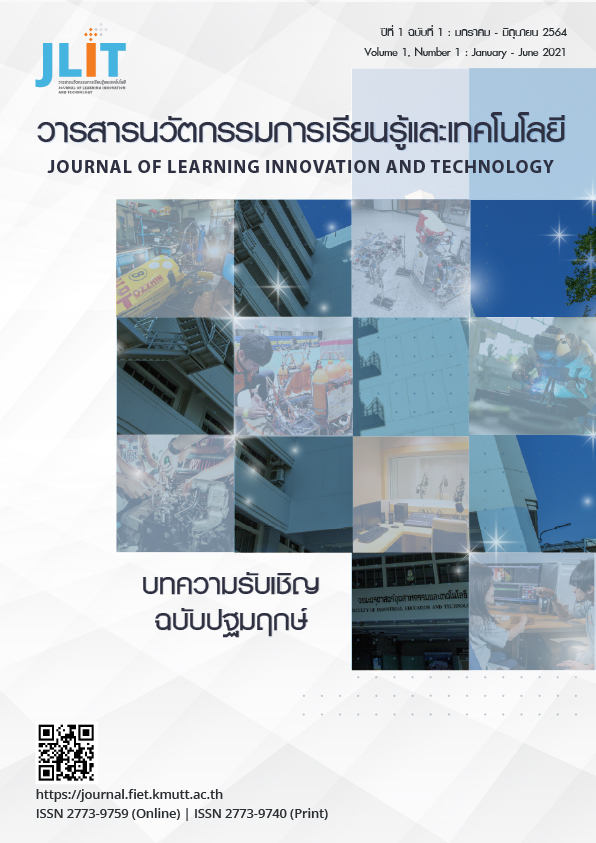Micro-credentials สำหรับการพัฒนาบุคลากรด้านการศึกษา
คำสำคัญ:
Micro-credentials, Digital badges, การพัฒนาทางวิชาชีพ, การพัฒนาอาจารย์, บุคลากรทางการศึกษาบทคัดย่อ
Micro-credentials (MC) เป็นรูปแบบหนึ่งของ Digital Badge ที่กำลังได้รับความสนใจโดยเฉพาะประเทศในทวีปยุโรป อเมริกาเหนือ และ Oceania เป็นอย่างมาก ในประเทศไทย มหาวิทยาลัยเทคโนโลยีพระจอมเกล้าธนบุรี ได้ริเริ่มการนำ Micro-credentials มาใช้ในการจัดการเรียนรู้โดยมีกลุ่มเป้าหมายเป็นคนทุกช่วงวัย บทความนี้มีวัตถุประสงค์เพื่อศึกษารูปแบบ ระบบนิเวศน์ ข้อจำกัดของ MC และการนำ MC ไปใช้ในการพัฒนาบุคลากรทั่วไป และบุคลากรที่มีความเกี่ยวข้องกับการศึกษา (educator) MC เป็นการเรียนรู้รูปแบบใหม่ที่เน้นเรื่องการรับรองความสามารถ มากกว่าวิธีการและเวลาในการเรียนรู้ มีความเหมาะสมกับการเรียนรู้ในยุคใหม่ มีความยืดหยุ่นในการเรียนรู้ ทำให้เปิดโอกาสให้คนเข้ามาเรียนรู้ได้มากขึ้น รวมทั้งสร้างทักษะการเรียนรู้ซึ่งเป็นเรื่องสำคัญในโลกที่มีการเปลี่ยนแปลงอยู่ตลอดเวลา ปัจจุบันมีการนำแนวคิด MC มาใช้ในการพัฒนาบุคลากรทางการศึกษา (educator) ทั้งในระดับการศึกษาขั้นพื้นฐาน และระดับอุดมศึกษา educator ที่เป็นผู้ขอรับการรับรองได้ยืนยันว่าการใช้ MC ทำให้เรียนรู้ได้จริง สามารถพัฒนาในงานได้ และเห็นแนวทางการพัฒนางานเพิ่มเติมขึ้น และสามารถเลือกให้เหมาะกับความต้องการและความสามารถของตนเอง
เอกสารอ้างอิง
UNESCO, Digital Credentialing: Implications for the recognition of learning across borders. 2018, UNESCO.
Kato, S., V. galan-Muros, and T. Weko, The emergence of alternative credentials. 2020.
Futures, H.S., T. Anderson, and K.N. Larsen, Annex 1: A European approach to micro-credentials. 2020.
McCullough, H. and K. Buch, Sharing the futures of learning in the digital age using certificates to engage faculty in professional development. Current Issues in Education, 2020. 21 (2).
Bloomboard. What are Micro-credentials? [cited 2021 May 3, 2021]; Available from: https://bloomboard.com/what-are-microcredentials/.
Center for Teaching Quality and Digital Promise, Micro-credentials: Driving teacher learning & leadership. 2016.
Quality, C.f.T. and D. promise. Micro-credentials: Driving teacher learning & leadership. 2016 [cited 2018 Nov 8]; Available from: https://digitalpromise.org/wp-content/uploads/2016/06/Microcredentials_Driving_teacher_learning_leadership.pdf
กฤติกา ตันประเสริฐ, Micro-credential: focus on small things that matter to printing and packaging industry, in วันการพิมพ์ไทย. 2563: Bangkok, Thailand.
Tanprasert, K., Innovative Teaching, Learning and Technologies for Transformation of Thai Higher Education toward Outcome-Based Education, in Transnational Perspective on Innovation in Teaching and Learning Technologies, E. Jean-Francois, Editor. 2018, Brill. p. 118-138.
Selvaratnam, R.M. and M.D. Sankey, An integrative literature review of the implementation of micro-credentials in higher education: Implications for practice in Australasia. Journal of Teaching and Learning for Graduate Employability, 2020. 12 (1): p. 1-17.
Dimitrijevic, S., et al., Badging Platforms: A Scenario-based Comparison of Features and Uses, in Foundation of Digital Badges and Mciro-credentials: Demonstrating and Recognizing Knowledge and Competencies, D. Ifenthaler, N. Bellin-Mularski, and D.-K. Mah, Editors. 2016, Springer: Switzerland. p. 141-161.
Lewis, M.J. and J.M. Lodge, Keep calm and credential on: Linking learning, life and work practices in a complex world, in Foundation of Digital Badges and Micro-credentials, D. Ifenthaler, D.-K. Mah, and N. Bellin-Mularski, Editors. 2016, Springer International Publishing: Switzerland.
p. 41-54.
Aberdour, M., Transforming workplace learning culture with digital badges, in Foundation of Digital Badges and Micro-credentials, D. Ifenthaler, D.-K. Mah, and N. Bellin-Mularski, Editors. 2016, Springer International Publishing: Switzerland. p. 203-220.
บัณฑิต ทิพากร and กลางใจ สิทธิถาวร ถาวร พิชญไขย, การพัฒนาหลักสูตร: ความต้องการของสังคมวิถีใหม่, in วิธีใหม่อุดมศึกษาไทย, ส.ด. ลักษณียนาวิน, ก.ล. สาธิตธาดา, and จ.ต.ญ. ไชยาคำ, Editors. 2021, สมาคมเครือข่ายการพัฒนาวิชาชีพอาจารย์และองค์กรระดับอุดมศึกษาแห่งประเทศไทย (ควอท): กรุงเทพ. p. 25-56.
CNBC. Google, Apple and 12 other companies that no longer require employees to have a college degree. 2018 [cited 2021 May 10].
Ghasia, M.A., H.J. Machumu, and E. DeSmet, Micro-credentials in higher education institutions: An exploratory study of its palce in Tanzania. International Journal of Education and Development using Information and Communication Technology, 2019. 15 (1): p. 219-230.
Brookfield, S.D., Self-directed learning, in International Handbook of Education for the Changing World of Work, R. Maclean and D. Wilson, Editors. 2009, Springer: Dordrecht. p. 2615-2627.
DeMonte, J., Micro-credentials for teachers: What three early adopter Stats have learned so far. 2017, American Institutes for Research. p. 12.
National Education Association. Assessment Literacy. [cited 2021 June 22]; Available from: https://nea.certificationbank.com/NEA/CandidatePortal/CategoryDetail.aspx?Stack=AL.
Neational Education Association. Community Schools Improvement Science. [cited 2021 June 22]; Available from: https://nea.certificationbank.com/NEA/CandidatePortal/CategoryDetail.aspx?Stack=CS
National Education Association. Restorative practice. [cited 2021 June 22]; Available from: https://nea.certificationbank.com/NEA/CandidatePortal/CategoryDetail.aspx?Stack=RP.
National Education Association. Micro-credential library. [cited 2021 June 22]; Available from: https://nea.certificationbank.com/NEA/Stack_Library.
Hamson-Utley, J. and E. Heyman, Implementing a badging system faculty development, in Foundation of Digital Badges and Micro-credentials, D. Ifenthaler, D.-K. Mah, and N. Bellin-Mularski, Editors. 2016, Springer International Publishing: Switzerland. p. 237-260.
National Education Association. Current teaching and learning micro-credentials. [cited 2021 June 22]; Available from: https://employees.senecacollege.ca/spaces/39/the-teaching-learning-centre/current-micro-credentials.
Disprz. How to shift to a capability building model for employee development. [cited 2021 June 22]; Available from: https://employees.senecacollege.ca/spaces/39/the-teaching-learning-centre/current-micro-credentials.
University of Calgary. Professional Education Program (PEP) Micro-credentials. [cited 2021 June 22]; Available from: https://nursing.ucalgary.ca/teaching-and-learning/pep/thriving-academia.
Luke, C. and V.M. Young, Integrating micro-credentials into professional learning: Lessons from five districts. 2020: Digital promise. p. 41-54.
French, D. and B. Berry, Teachers, Micro-credentials, and the performance assessment movement. VUE, 2017 (46):
p. 37-43.
ดาวน์โหลด
เผยแพร่แล้ว
ฉบับ
ประเภทบทความ
สัญญาอนุญาต
จริยธรรมในการตีพิมพ์บทความ
- กองบรรณาธิการขอสงวนสิทธิ์พิจารณาบทความที่มีรูปแบบและคุณสมบัติที่ครบถ้วนตามข้อกำหนดเท่านั้น หากบทความนั้นไม่ตรงตามข้อกำหนด กองบรรณาธิการฯ มีสิทธิ์ในการปฏิเสธลงตีพิมพ์
- ในการขอหนังสือตอบรับการตีพิมพ์ กองบรรณาธิการฯจะออกให้ในกรณีที่บทความนั้นพร้อมที่จะลงตีพิมพ์โดยไม่มีเงื่อนไขเท่านั้น
- การพิจารณาบทความ (Peer review) ของวารสารนวัตกรรมการเรียนรู้และเทคโนโลยีถือเป็นที่สิ้นสุด ผลงานวิชาการอาจไม่ได้ลงตีพิมพ์ในเล่มที่กำหนดไว้จนกว่าจะผ่านการพิจารณาบทความ (Peer Review) และพร้อมจะลงตีพิมพ์เผยแพร่แล้วเท่านั้น
- งานวิจัยที่เกี่ยวข้องกับจริยธรรมของการวิจัยในมนุษย์และสัตว์จะต้องผ่านการประเมินโดยกรรมการจริยธรรมของต้นสังกัด
- บทความที่ส่งมาต้องไม่เคยเผยแพร่ในสิ่งพิมพ์อื่นใดมาก่อน และต้องไม่อยู่ในระหว่างการพิจารณาของวารสารอื่น บทความที่ได้รับการตีพิมพ์ถือเป็นลิขสิทธิ์ของวารสาร JLIT



